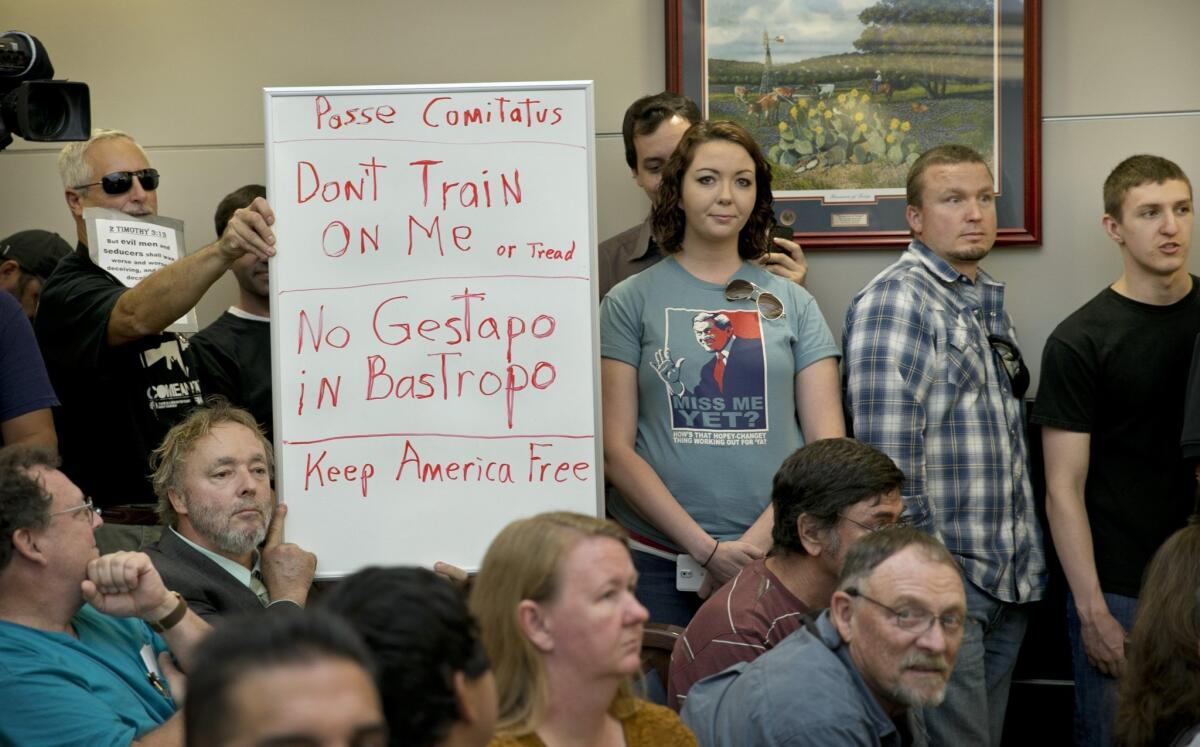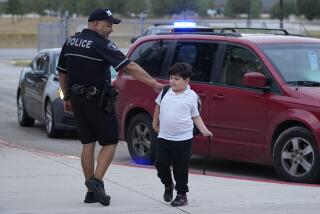Why some Texans are suspicious of a massive military operation called Jade Helm 15

Bob Welch, standing at left, and Jim Dillon, hold a sign at a public hearing last April about the Jade Helm 15 military training exercise in Bastrop, Texas.
- Share via
Reporting from Dilley, Texas — Jade Helm 15 — a two-month, seven-state Army Special Operations training exercise — is scheduled to start Wednesday, prompting concerns among some residents, especially in Texas, where the governor ordered the state guard to monitor it.
A town hall meeting this spring drew hundreds of residents to one of the training sites in central Texas, where an Army spokesman was inundated with questions from conspiracy theorists who had traveled from across the state. Late Tuesday, the Army released a statement again attempting to allay residents’ fears by clarifying what soldiers will be doing, and where.
The training will be on private land and military installations, including National Guard training centers and an Army Reserve center in Arizona; Eglin Air Force Base in Florida; Camp Beauregard in Louisiana; Camp Shelby, the Naval Research Laboratory, Stennis Space Center, and the U.S. Navy Seabee Base in Mississippi; Cannon Air Force Base and Otero County in New Mexico; Carbon and Emery counties in Utah; and more than a dozen sites in Texas.
The plan, Army officials say, is to develop new warfare tactics and procedures in a landscape similar to combat zones in the Middle East and Afghanistan.
“The public can expect little disruption in their day-to-day activities since much of the exercise will be conducted in remote areas,” the statement said. “The most noticeable effect the exercise may have on the local communities is a slight increase in vehicle traffic and the limited use of military aircraft and its associated noise.”
According to the statement, civilian government officials, “will receive regular updates as the exercise progresses,” the statement said.
Texas Gov. Greg Abbott’s office will receive daily updates from a team of four to five officials from the Texas State Guard, one of three branches of the state-owned Texas Military, stationed with a U.S. military liaison at a joint operations center at the guard’s Camp Mabry, north of Austin, according to an aide.
“We are serving more than anything as a communications facilitator between the military and residents,” the aide said.
“It is important that Texans know their safety, constitutional rights, private property rights and civil liberties will not be infringed,” Abbott wrote last April to the commander of the state guard.
In Texas, soldiers are expected to train at Camps Bullis and Swift, as well as more than a dozen counties, including: Burleson, Brazos, Edwards, Howard, Hudspeth, Kimble, Martin, Marion, Real, Schleicher and Tom Green.
Some residents expressed concern after listening to reports from Austin-based TV and radio host Alex Jones, a conspiracy theorist who has warned of a government takeover for decades. Jones seized on the exercise as proof. Just last week, protesters gathered at the Alamo convinced that its designation as a UNESCO World Heritage site was a prelude to a United Nations takeover.
A handful of Texans said they don’t trust state officials and plan to try to monitor Jade Helm themselves. Some already have created “Counter Jade Helm” Facebook pages and a website to submit activity reports and map their surveillance.
“We’re the neighborhood watch of this program,” said Eric Johnston, a retired Arizona firefighter and sheriff’s deputy who now lives in Central Texas. He plans to drive to two of the training sites Wednesday in Bastrop and Junction to search for activity.
“It would be wonderful if we pull up and there’s two guys in Humvees getting coffee at Starbucks. I don’t think that’s going to happen,” said Johnston, 52, of Kerrville.
Johnston said an Army spokesman told him at the Bastrop meeting that no foreign troops would participate in the training, but Johnston was still concerned.
“Would you like to wake up tomorrow morning and see a dozen Russian soldiers? Or U.N. troops?” he said, adding, “Do I think we’re going to be stormed by Russian troops? No. Not yet. My opinion is they’re practicing something they’re going to do in Afghanistan. Look at the places they’re picking: steep terrain, desert. … It’s the secrecy that hurt them.”
Johnston said 50 people are involved in monitoring statewide, including eight in Bastrop. Some, including Johnston, are licensed to carry concealed firearms, but he stressed that, “We’re there as the neighborhood watch: see what they’re doing, observe and report.”
Johnston said many locals oppose Jade Helm and are “supportive of our action.” But there are also those who support the exercise, in Bastrop and statewide.
When former Texas Lt. Gov. David Dewhurst wrote a piece in the Dallas Morning News urging citizens to support the military exercise this spring, he noted that, “Unfortunately, some Texans have projected their legitimate concerns about the competence and trustworthiness of President Barack Obama onto these noble warriors. This must stop.”
In Bastrop, retired Texas A&M social work professor Ed Skarnulis said residents are more worried about outsiders descending on their town to monitor Jade Helm than they are about the soldiers.
“They think it reflects poorly on the county, and there could be economic repercussions if the county is perceived as a place full of conspiracy theorists,” said Skarnulis, 75.
“They represent a tiny proportion of the population,” he said. “The majority of people in our county are appalled by that sort of attitude. I hope we can put this to rest.”
Twitter: @mollyhf
ALSO:
Abortion clinics ask Texas restrictions be put on hold pending appeal
Insane or not? Jurors to begin deliberations in Colorado theater massacre
Gun rights advocates’ push for campus-carry measures like Texas’ is slow going
More to Read
Sign up for Essential California
The most important California stories and recommendations in your inbox every morning.
You may occasionally receive promotional content from the Los Angeles Times.











